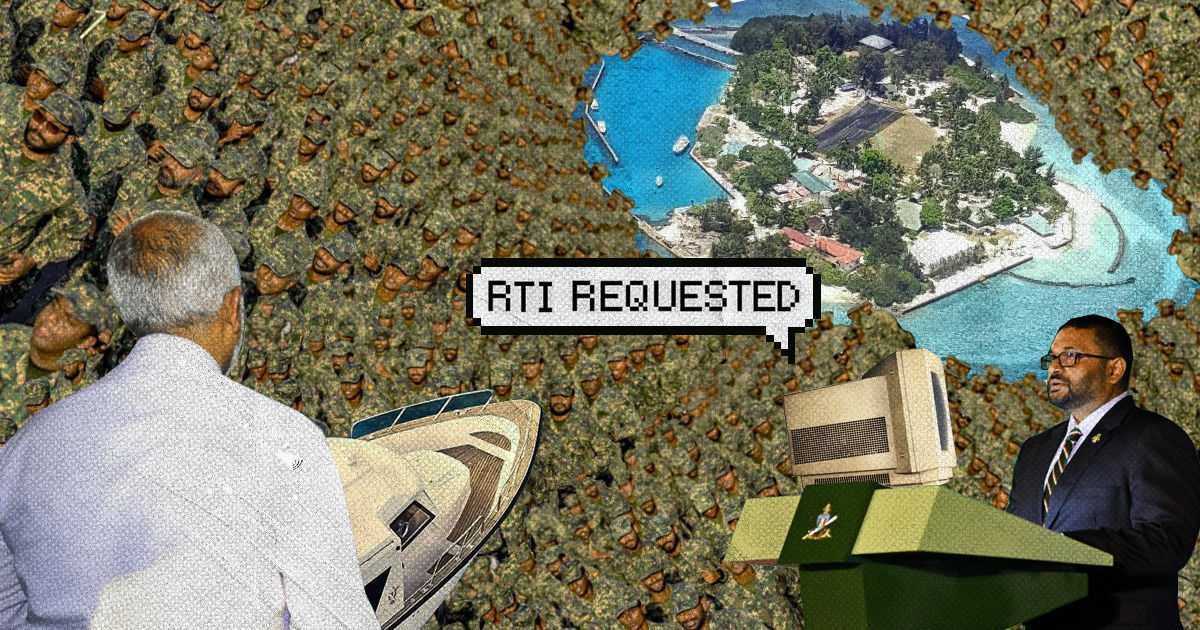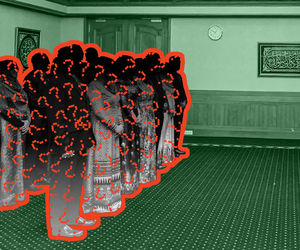Threat to probe presidential retreat query creates "dangerous precedent"
The threat came in response to an RTI request.

Artwork: Dosain
13 Apr 2025, 15:10
Samah Ibrahim Didi wanted to know how often the first family visited the presidential retreat island. The defence ministry responded to the right to information request by placing him under investigation.
In a RTI submission on March 24, Samah asked for the number of times President Dr Mohamed Muizzu and his family had travelled to Aarah – a secluded island near Malé with maintenance and upkeep covered by the military budget – since assuming office in November 2023. He also asked for a breakdown of expenses incurred for the trips.
The defence ministry rejected the request on the grounds that sharing such details could “hamper efforts” by the Maldives National Defence Force to provide protection for the first family. Compliance with the RTI request could also trigger criminal charges over the disclosure of confidential information, the ministry claimed.
“And since the use of information such as everything that the president and his family do at the places designated for their residence, the number of times they go to these places, and the time and reason, could pose challenges to the legal responsibility being undertaken by the defence forces for ‘ensuring the safety and security of the president and the president’s family,’ we note that the defence force is doing everything necessary to find out the intention of those who seek that information,” the reply stated.
The defence ministry gave the same response to Adhadhu when the news website sought the information.
It was the first investigation undertaken in response to an RTI request.
Speaking to the Maldives Independent, Samah described the defence ministry’s reply as an attempt to “intimidate and deter” legitimate requests for information.
“Criminalising attempts to inquire into how much and why money was spent from the public coffers is ridiculous and should not be taken lightly,” he said.
Samah, who is studying dentistry in Russia, said he plans to lodge a complaint at the Information Commissioner’s Office and file a fundamental rights petition at the Supreme Court.
Information Commissioner Ahid Rasheed described the ministry’s response as “extremely worrying.”
“We should never forget that this [right to information] is a constitutionally guarded right,” he told the Maldives Independent. “No state institution can warn against exercising one’s rights and act in an intimidatory manner that discourages and creates fear around exercising rights and freedoms.”
As the reasoning or logic behind an RTI request could be subjective, Ahid stressed that “state institutions do not have to assess the reasonability of a request – the law does not warrant it.”
The RTI Act of 2014 requires information officers to comply with a request for information within 21 days with a 30-day period to justify the failure to do so.
The law specified exemptions in cases where the information is classified by law or when disclosure might adversely affect the government’s ability to manage or administer the economy and ensure national security. Non-disclosure was also permitted if the information could infringe on the immunities of parliament and the courts.
“If the state cannot provide the information, it should provide the reasoning as per the law – but nobody should be threatened for pursuing a legitimate right under the constitution and laws,” said Azza Mohamed, governance manager at Transparency Maldives, the local chapter of Transparency International.
“From an accountability perspective, this is extremely worrying; this will certainly deter others from submitting RTI requests."
During his campaign for the presidency, candidate Muizzu repeatedly lambasted the previous administration’s poor RTI record. Following his election, Muizzu assured journalists that RTI requests would not be necessary. "All information will be available. Nothing will be withheld,” he pledged. The public would not need to “beg” either by submitting forms to seek information, he assured.
But over the past year, the Attorney General’s office regularly challenged orders from the Information Commissioner to comply with right to information requests, most recently refusing to disclose the identities of 228 political appointees who had been dismissed in October.
In 2024, the Information Commissioner’s Office registered 566 cases, an increase of 61 percent from the previous year. Many of the complaints concerned government offices “not responding at all to RTI requests.”
Discussion
No comments yet. Be the first to share your thoughts!
No comments yet. Be the first to join the conversation!
Join the Conversation
Sign in to share your thoughts under an alias and take part in the discussion. Independent journalism thrives on open, respectful debate — your voice matters.




